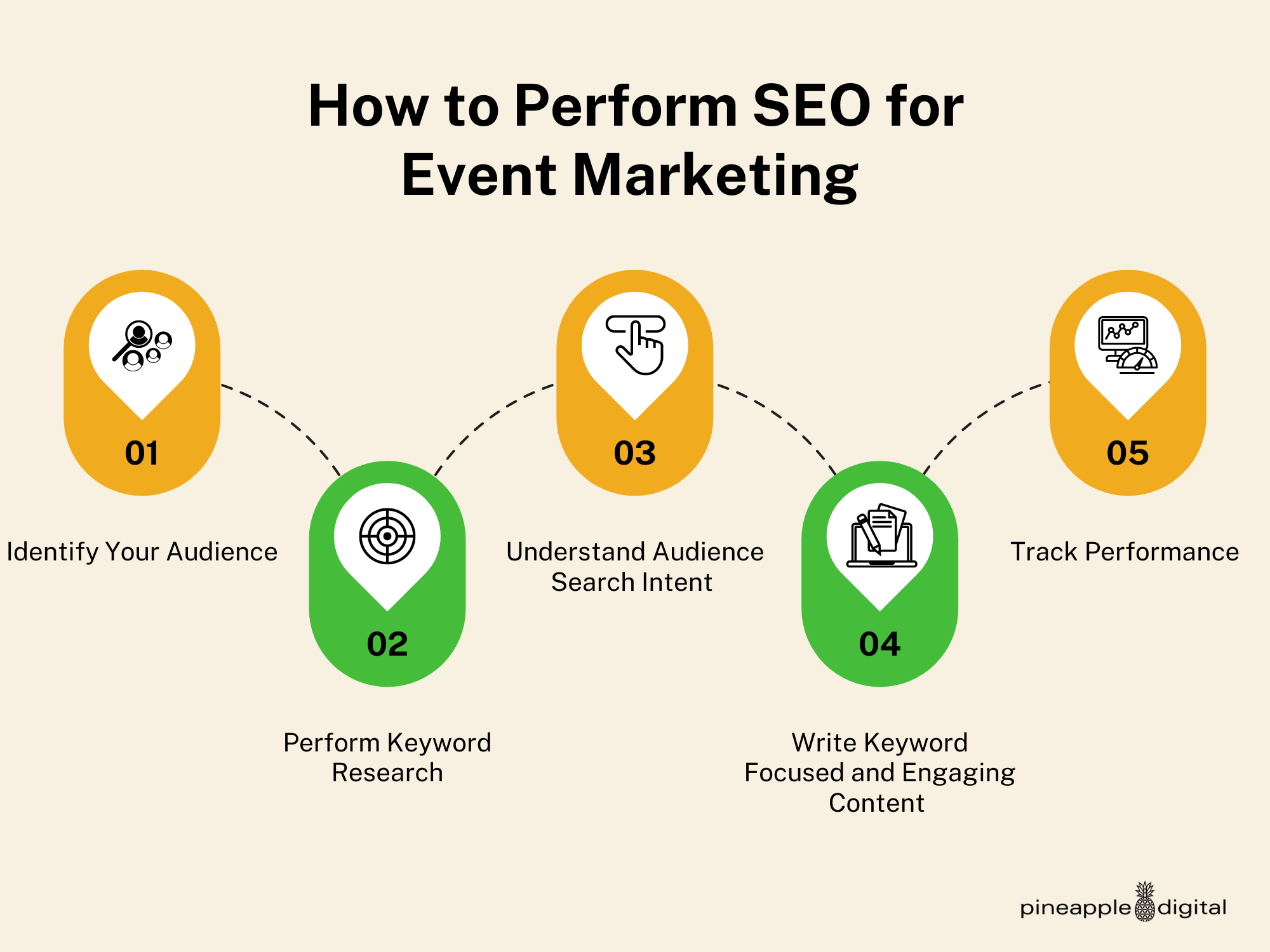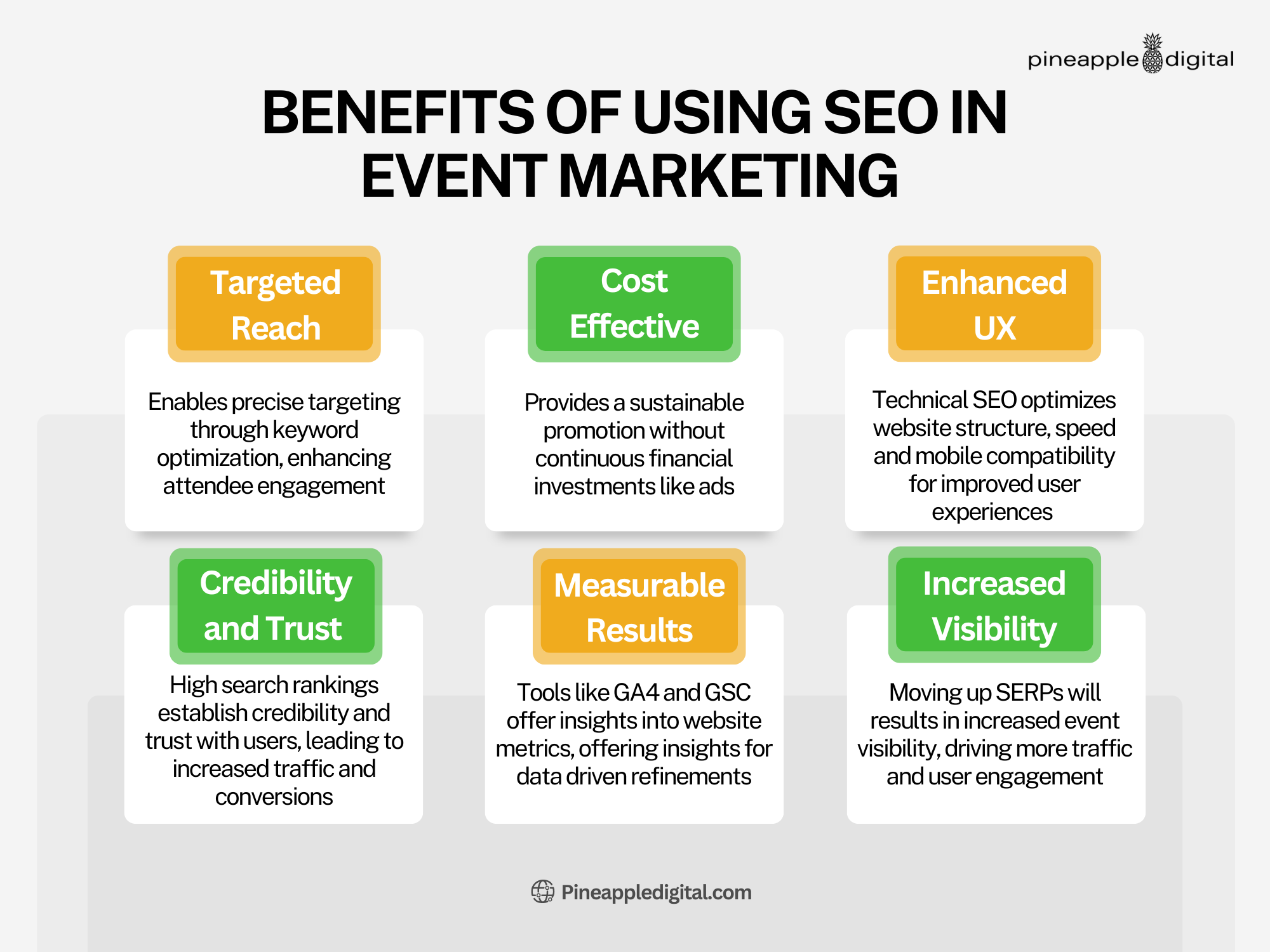Search Engine Optimization (SEO) is a combination of techniques and strategies designed to increase both the quantity and quality of organic traffic sent to your website by ranking higher on popular search engines like Google. For event marketers, SEO serves as a tool, offering strategies to boost an event’s visibility, reach a targeted audience, and increase event attendance and engagement rates.
How to Perform SEO for Event Marketing
Understanding how SEO can boost your event marketing efforts is crucial for maximizing your event’s online visibility, and ability to attract attendees. Here’s a guide to effectively use and integrate SEO into your event marketing campaign.

Identify Your Audience
For an effective SEO event marketing strategy, you will need a deep understanding of your target audience. Here’s how to effectively identify your target audience:
- Research Your Audience: Explore the demographic details of your audience such as age, gender, and profession.
- Understand Their Interests: Explore your audience’s passions, and interests to gain insights into what resonates with them. You can use this knowledge to write messaging that speaks directly to their preferences and engages them on a personal level.
- Establish Credibility and Trust: Identify the sources your audience trusts and understand why they trust them. Then, use similar strategies to build credibility and trust within your target audience.
Perform Keyword Research
Conducting thorough keyword research is essential for optimizing and writing effective and relevant content that engages your audience. Additionally, insights from keyword research can strategically inform various aspects of your event planning, such as choosing a suitable location or deciding on an event name. Here’s how you can go about performing keyword research:
- Brainstorm Keywords: Begin by writing down relevant keywords related to your event, considering various aspects such as event theme, location, and target audience demographics.
- Use Keyword Research Tools: Leverage tools like Google Keyword Planner, Ahrefs, and SEMrush to identify high-potential keywords based on search volume, competition, and relevance to your event.
- Target Long-Tail Keywords: Focus on long-tail keywords to target specific audience segments effectively, catering to their specific needs and interests for better engagement and conversion rates.
- Analyze Competitor Keywords: Explore the keywords your competitors are targeting and identify any gaps or opportunities in your keyword strategy. By understanding the keywords they rank for, you can refine your approach and begin to rank for new keyword opportunities.
- Focus on Location-Specific Keywords: Tailor your keyword strategy to include location-specific keywords if your event targets a specific geographical area or if location plays a significant role in attendee participation. Incorporating localized keywords can help improve your event’s visibility among local audiences.
- Utilize Social Listening: Monitor social media platforms and online communities to understand the conversations and discussions surrounding topics related to your event for more insights into potential keyword targets.
Write Keyword Focused and Engaging Content
Once you have identified your keyword targets, it is time to put out the right content in order to rank for them. Creating engaging and relevant content is crucial for driving more organic traffic to your website and bringing more visibility and engagement to your event. Here are strategies to effectively engage your audience:
- Build Out a Landing Page for Your Event: Develop a high-quality, informative page for your specific event that can dry in users who don’t already know who you are.
- Incorporate Keywords: Make sure to strategically incorporate keywords into your content. More specifically, include the target keywords in the meta data of the page, the HTML structure, and write content that answers common user questions about the event (these can be identified through keyword research).
- Utilize Video and Images: Incorporate videos and images into your content, providing your audience with a richer and more immersive experience that gives them a better visual of what attending your event would be like. Beyond UX benefits, Google loves videos and images!
- Linking: Strategically include internal and external links to add context, credibility, and value to your content. Internal links guide readers to relevant pages, while external links to reputable sources boost credibility. Interlinking pages can also improve their SERP ranking, for example, if a page ranks well, it can increase the ranking of pages it is linked to.
- Content Promotion: Develop a strategy for promoting your content across various channels, including social media, email newsletters, industry forums, and online communities. By actively promoting your content, you can increase its visibility, reach a wider audience, and drive more traffic to your event website.
Track Performance
Track key metrics to evaluate the effectiveness of your SEO efforts. This will enable you to adjust your strategy and make informed decisions. Here is how you can effectively track your success:
- Utilize Analytics Tools: Leverage tools like Google Analytics, Google Search Console, and other performance-tracking tools to gain insights into website and event performance and track metrics such as traffic sources, user behavior, and conversion rates.
- Adjust Strategy: By regularly reviewing and monitoring your performance, you can identify trends, opportunities, and areas for improvement, allowing you to refine your approach and make data-driven decisions to optimize your strategy.
Special Considerations When Pushing SEO for Event Marketing
Event marketing comes with unique SEO challenges and opportunities. Understanding these can significantly enhance your event’s online visibility and draw more attendees.

Pre, During, & Post SEO Efforts
- Pre-Event SEO: Start your SEO efforts well in advance. Target anticipatory keywords like “what to expect” and “how to prepare,” to generate early interest. This phase should focus on building awareness and excitement.
- During the Event: Leverage real-time content updates or streaming to engage those who cannot attend in person. Optimize for immediate event-related searches.
- Post-Event: Keep the momentum going with post-event content such as posting videos and photos from the event on Google My Business with summaries. This content should aim to extend the life cycle of the event’s SEO impact and prepare the groundwork for future events.
Local SEO for Local Events
- Geo-Targeting: Incorporate local keywords, register on local event calendars, and engage with local online communities. For events with a physical location, make sure to optimize for “near me” searches by including the location in your keywords. Never use simply “events near me” but rather “event in Atlanta, GA” for optimal organic performance.
- Optimize Your GMB: Optimize your Google My Business by including thorough summaries of your events and building out your GMB profile. You should also push for reviews from those attending the event to boost your overall profile reputability. This will help you show up more for localized searches.
Mobile Optimization
- Responsive Design: Ensure that the event website is responsive and mobile-friendly, as mobile users often look up event information on-the-go. This includes quick loading times, easy navigation, and accessible event schedules.
- Local Mobile Searches: Optimize for local mobile users who may be looking for last-minute event details, directions, or parking information.
Keyword Strategy for Events
- Event-Specific Keywords: Utilize keywords that are unique to your event, such as the event name, notable speakers, venue, or specific activities planned. These should be prominently featured in your titles, meta descriptions, and headers.
- Long-Tail Keywords: Target long-tail keywords that capture the specifics of your event. These are less competitive and can attract a highly targeted audience. Examples include “outdoor yoga retreats in California June 2024” or “developer conferences for AI advancements in NYC.”
Effective SEO Event Marketing with Pineapple Digital
Optimizing your event’s online presence involves crafting a comprehensive SEO strategy tailored to your event and the audience you’re targeting. However, SEO is expansive and constantly evolving, making it difficult to pursue alongside a busy work schedule. That’s why at Pineapple Digital, we position ourselves as a strategic partner, enhancing and complementing your existing SEO efforts – not replacing them altogether. Our role is to maximize your performance with our trusted experience, innovative strategies, and data-driven approach, ensuring your SEO strategy not only meets but exceeds your objectives.
We know the pivotal role SEO plays in increasing your event’s visibility which is why we have tailored solutions, ensuring your event marketing strategy is effective and efficient. Contact us today to learn how our SEO strategies can enhance your marketing efforts and help you achieve unparalleled success.
